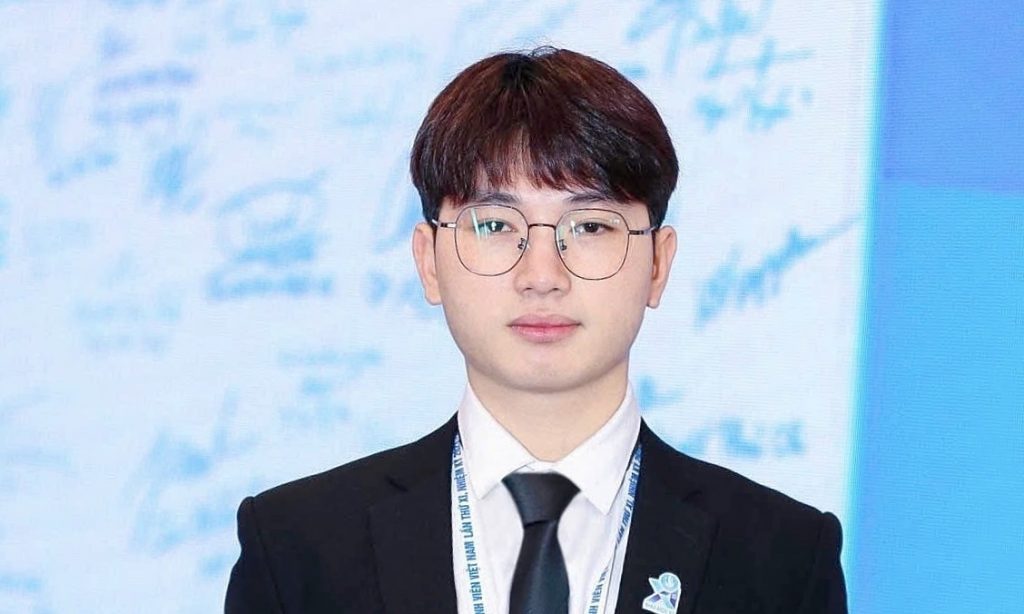
An energy engineering student in Hanoi has secured fully funded PhD scholarships from top universities in Singapore, Australia, and the U.S. for his research in semiconductor materials, all before completing his undergraduate degree.
Nguyen Van Thang, 22, has chosen to pursue his PhD at Virginia Tech in the U.S., turning down offers from Nanyang Technological University (NTU) in Singapore and the University of Sydney in Australia, both ranked among the world’s top 20 universities.
“I study semiconductor materials and believe the U.S. offers more opportunities for me in this field,” Thang said.
His PhD program covers tuition and provides a monthly stipend.
Thang grew up in a rural area on Hanoi outskirts and initially aspired to study at the Foreign Trade University in the capital. However, after not being admitted, he enrolled at the University of Technology in Hanoi in 2021. From the outset, he set a goal to be among the top four students in his class to secure a scholarship. Once he achieved that, he planned to pursue a master’s degree and eventually a PhD overseas.
“At the time, I thought that with just a bachelor’s degree, I might end up working on construction sites for VND7-8 million ($274-314) a month,” Thang said. “That was less than what I made tutoring online. To get a better job, I had to study further.”
To prepare for studying abroad, Thang conducted extensive research on online forums and university websites, identifying three key areas to focus on – maintaining a high GPA, improving English proficiency, and engaging in research.
Through hard work and perseverance, Thang maintained a 3.8 GPA and scored 7.0 on the IELTS. He also won second place in the National Physics Olympiad for Students and received several domestic scholarships.
Thang’s research journey began in his second year, when he joined a professor’s research group. Initially assigned basic tasks like cleaning equipment and weighing samples, he gradually learned to write and submit research papers. For each project, he read hundreds of studies to refine his research direction.
“There were times I felt stuck, but quitting was never an option,” he said.
His dedication paid off. Thang co-authored four research papers on semiconductor materials in top scientific journals, including Ceramics International and Materials Today.
In October 2024, Thang began applying for PhD scholarships, initially prioritizing NTU. His application included a research statement, future plans, and recommendation letters. He also underwent multiple rounds of interviews, where professors rigorously evaluated his knowledge, technical skills, and commitment to the field.
“Professors asked detailed questions about my research to test my understanding and technical ability,” Thang said. “In my research group, I was second only to my professor, so I felt confident in my answers.”
After securing an offer from NTU, he expanded his applications to universities in the U.S. and Australia.
His interview with Virginia Tech was particularly intense. Expecting a brief discussion, he prepared a 10-slide presentation. However, the professor stopped at each slide to ask in-depth questions, turning what he thought would be a short conversation into a three-hour interview.
Impressed by his academic record and research contributions, Virginia Tech awarded him a full scholarship.
Phi Ngoc Tuan, Thang’s classmate and research partner, described him as highly disciplined and focused.
“Whether he’s studying, researching, or even playing video games, he gives his best effort,” Tuan said. “He also started a tutoring center, and it’s impressive how he manages multiple responsibilities at once.”
The energy engineering program at Hanoi’s University of Technology typically takes four to five years to complete. However, Thang worked hard to graduate a semester early, allowing him to begin his PhD in August. He is also learning programming and machine learning, as his professor advised these skills would support his future research.
“I’ll work hard to gain knowledge and experience so I can contribute to semiconductor materials research,” Thang said.





